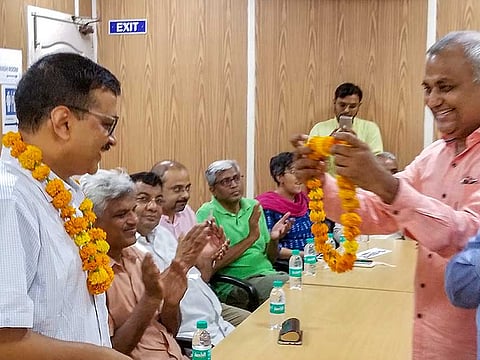India’s grave institutional challenge
With general elections barely 10 months away, India has to prove its credentials again

The sofa dharna (agitation) of the Chief Minister of Delhi, Arvind Kejriwal, at Delhi Lieutenant Governor (LG) Anil Baijal’s waiting room ended after a mystery deal, but the portents for democracy in India are chilling.
Consider this. Ever since Narendra Modi became Prime Minister in 2014, he has been carrying out a systematic probing of the institutional weakness of the other pillars that make up India’s democracy. As former BJP leader Arun Shourie told me: “After Modi has taken office an undeclared emergency is in place. In some ways, it is worse than Indira Gandhi’s emergency when we knew what we were fighting against. This is a diffuse emergency.”
Nothing illustrates this better than Kejriwal’s “sofa dharna”. That a party elected with a brute majority of 67 out of 70 seats in Delhi, which gave the BJP a bloody nose, is today facing revenge at the hands of subverted institutions.
Modi has not forgiven Kejriwal for that electoral humiliation. AAP has had more than a dozen of its members of the legislative assembly (MLA) arrested for trivial cases (one in the middle of holding a press conference), Kejriwal has been raided by the Central Bureau of Investigation (CBI), had his chief secretary jailed, all his powers stripped away steadily by diktats from the LG, the IAS officials now completely not cooperating with his government, and even AAP donors sent notices by the Income tax authorities.
The Election Commission, considered a beacon of Indian democracy, disqualified 21 AAP MLAs and were handed a huge snub by the Delhi High Court, which held the move illegal. Even the Supreme Court has taken an inordinate amount of time to decide a case asking to clarify the powers of Delhi government.
Democratic institutions are not frozen in the bygone days of glory and are living breathing things animated by the people who represent them. Under Modi, they seem to have lost their elan, their meta clarity of providing the necessary checks and balances.
Four Chief Ministers — including Mamata Banerjee, Chandra Babu Naidu, H.D. Kumaraswamy and K. Pinyari Vijayan — have backed Kejriwal’s latest protest. Even Modi’s National Democratic Alliance allies such as Nitish Kumar’s Janata Dal (United) and the Shiv Sena have extended support to the Delhi chief minister.
The reason is simple. The principles of federalism and democracy are at stake. The Congress, which is pathologically suspicious of AAP and treats it as a pariah and calls it a “B team of the BJP”, has preferred to sit it out, but finds itself isolated when it was trying to act as a linchpin and catalyst of opposition unity.
In general election season, as the countdown to the big fight begins, Modi has shown that he has no respect for constitutional propriety. He is scared that the putative allies of the NDA could be the next AAP. With their Delhi overreach, Modi and Bharatiya Janata Party president Amit Shah have shown that they think of democracy as a personal grudge match — a fight to the bitter end.
The way the BJP pulled the plug on its alliance government with Mehbooba Mufti’s People’s Democratic Party in Jammu & Kashmir is also a pointer to India’s ruling party’s determination to play the ‘nationalist card’ in the big fight in 2019. Modi had earlier claimed that his demonetisation move had broken the back of insurgency in J&K, but the alliance has been broken because of the security situation.
With its mediocre record in governance with a burgeoning job crisis, stalling economy, endemic agrarian distress, Modi can’t really showcase his track record. So India is back to the mainstreaming of bigotry and hate.
This is where the institutions come in.
Currently, the diagnosis would be that institutional credibility is under threat. The Opposition has rallied around because they know they can be next in Modi’s zero sum game.
AAP had promised change, but it has not been able to deliver, with Kejriwal being viewed with increased cynicism for his unbridled ambition and getting rid of everyone who has posed a threat to him from his party. But, with a little help from Modi, he has regained some credibility again. This is the Congress accusation that the two are in league and acting as Yin and Yang. Like most things in Indian politics, it is complicated and the congress will do well to at least pay lip service to principles while not ceding Delhi to Kejriwal.
Kejriwal told me that his next move would be to take to the streets and fight for full statehood for Delhi. He even dramatically said he would support the BJP if they delivered. The need of the hour for every institution now is to ensure its credibility and its role in applying the checks and balances on Modi, who seems to view democracy as an irritant.
With general elections barely 10 months away, the institutional challenge is grave. The largest democracy in the world has to prove its credentials again.
Swati Chaturvedi is a print and broadcast journalist based in New Delhi. She has written two books — Daddy’s Girl and I Am A Troll.



